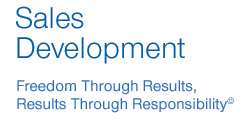The Most Important Process dated 11/17/2007 12:47 PM
August 12th, 2008Executives understand the importance of formalized processes in their business. Most companies have established elaborate processes for manufacturing, distribution, finance, purchasing, maintenance, employee reviews, and a host of other fundamental aspects of their organizational backbone.
I have visited with hundreds of business leaders and asked the question:
“What process do you follow for SALES?”
In response, I usually get a blank stare or the question, “What do you mean?”
The fact that most business executives have never considered implementing a process or system for sales never ceases to amaze me. While most business leaders clearly understand the importance of investing heavily in the development of back-end processes, only a small percentage have a process to deal with the aspect of their business that has the single largest potential impact on their ability to generate cash and improve their profitability—SALES.
Another seemingly obvious, yet often overlooked issue which can greatly limit sales growth is confusion about the difference between a “product expert” and “sales expert”. Some people think these two are one and the same. This could not be further from the truth. Most companies recruit and train with a heavy emphasis on product or industry knowledge and experience. While these can be somewhat important, they will not determine whether or not an individual will succeed in creating business. If generating revenue and profit for your company are your goals, recruit and train primarily for sales, secondarily for product/industry.
The face that your company presents to the world should be consistent, attractive, and competent. In order to make this happen, you must have a sales process. So how do you start?
You can’t fix what you can’t see:
It doesn’t matter if you have a huge direct sales force or if you are just beginning to think about hiring salesperson number one. An essential first step is to evaluate your people. Excellent objective assessment tools are available for this purpose. Make sure to select a tool that incorporates both Critical Success Factors and Core Sales Competencies.
Create the most effective organization:
Assess the results, then combine the objective data with your sales plan to achieve your goals. An effective sales team includes leaders, managers, farmers (account managers), and hunters (to secure new business). Each one of these roles incorporates different skill-sets and competencies. Use the objective assessment data to make sure your round pegs are set into round holes. If your company is small and one person must wear multiple hats, make sure that he/she possesses or is trained in multiple competencies.
Use a selling system:
Do not send your salespeople out to “do their thing.” Send them out to do YOUR THING. There are several selling systems available. Some are good, some are not. Make sure to select a system that is consistent with your company’s objectives and core values and one that will result in long-term, win/win relationships. Your selling system should be “owned” by anyone in your organization that has contact with your customers and salespeople. Your team should be fluent in the language.
With effective training and practice, your selling system will soon become second-nature and part of the company culture.
Implementation of an effective, understandable, and easy-to-use sales process will have a dramatic effect on both the top and bottom lines of your business. Incorporating an effective process for recruiting/hiring salespeople and measuring results will multiply your gains and improve your ability to control your future.
© Copyright 2009 Joe Zente









